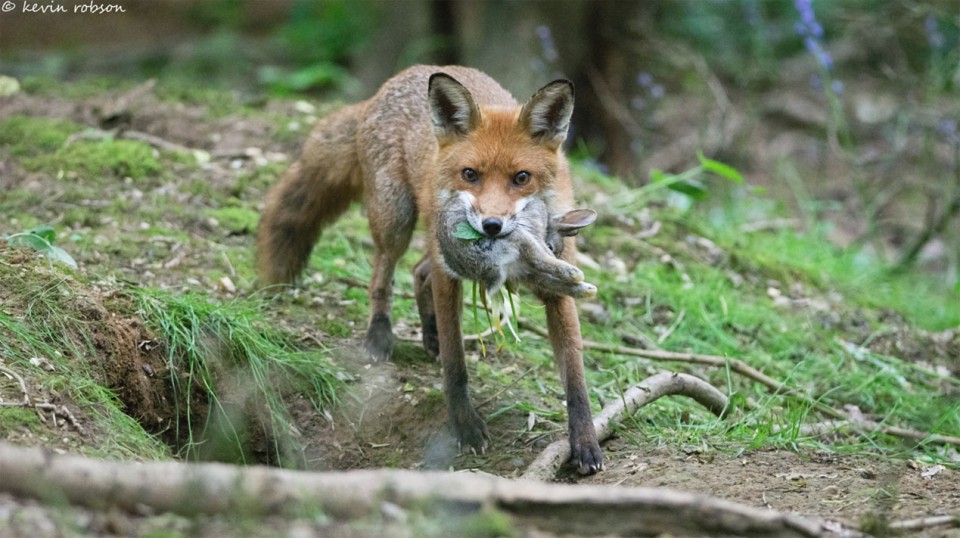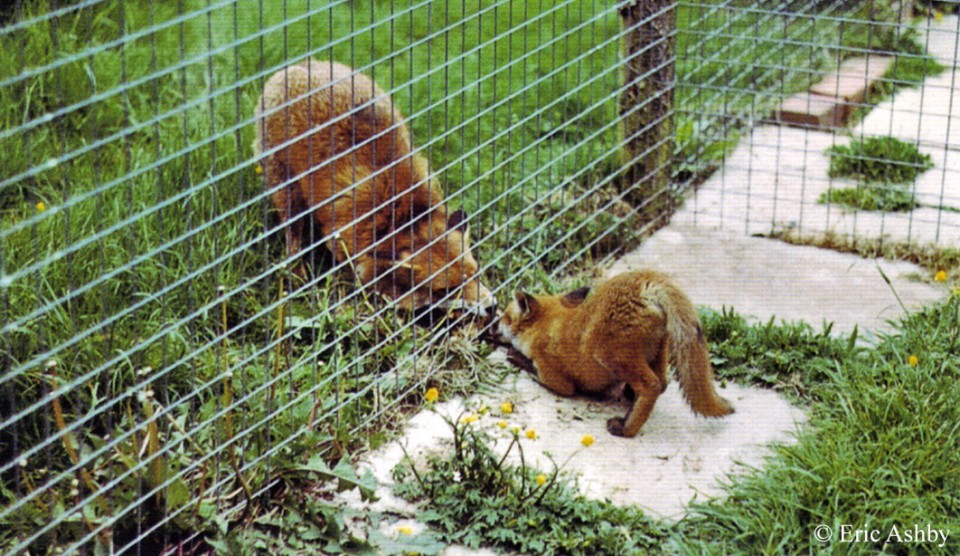Red Fox Behaviour - Helpers in Fox Society
In some cases philopatric animals (particularly females) will assist with the raising of subsequent litters of cubs: this is known as alloparental behaviour (raising, or helping to raise, offspring that are not your own). This assistance comes in the form of providing food for the cubs, grooming them and playing with them – in some cases these non-breeding vixens will defend them from intruders and, occasionally, they may even lactate and suckle the cubs. There are even reports of subordinates bringing up the cubs in the event of the dominant vixen’s death.
In his book, Running with the Fox, David Macdonald recounts gamekeeper lore telling how, after killing a ‘milky’ vixen, it is not unusual to then shoot a ‘dry’ (non-breeding) vixen bringing food to the cubs and that some keepers have reported barren vixens attempting to dig out earths that have been gassed. Macdonald also witnessed group members bringing food to an injured adult family member that could not provision for herself. Indeed, while the vixen was recovering from this incapacitating injury, two of her barren daughters raised her cubs along with the dog. Where two dog foxes lived in the same family group, Macdonald observed both bringing food to the dominant dog’s cubs and, in Bristol, Harris and his colleagues found male and female helpers shared equally in duties.
By contrast, some observers have failed to find any evidence that helpers actually help. In his book Foxwatching: In the Shadow of the Fox, for example, Martin Hemmington described an incident where a vixen he was regularly observing was confined to the earth with newborn cubs. Unfortunately, her mate -- who had up until now been providing food for her -- was killed by a car and the vixen was forced to go out looking for food (leaving the cubs alone). Hemmington noted that at no time did any of the other six subordinates in the group step in to take over the food provision, leading him to conjecture that perhaps these "aunties" only help with food gathering once the cubs have emerged. Indeed, this ties in with Macdonald’s observations of his fox groups in Oxford. He found that, although the dominant vixen was more amicable towards subordinates while she was pregnant (sleeping with and grooming them), this changed once the cubs were born; then the breeding vixen launched numerous ferocious attacks on them until the cubs were several weeks old, at which point the subordinates were permitted to babysit.

While subordinates do, in most cases, help the dominant pair raise the cubs, there is debate around whether this actually increases cub survival. In a 1979 paper to the journal Nature, Macdonald described the case of a dominant vixen who sustained a serious injury to a front paw, leaving her unable to tend to her four week old cubs; during this period the cubs were found with the subordinate vixens in the group, with whose care they all survived. This certainly suggests that, in times of crisis at least, subordinates can step in and improve or even ensure the survival of the cubs.
The situation that Torbjörn von Schantz found at his study site in Revinge, south Sweden, however, was quite different. In a paper to the journal Oikos during 1984, von Schantz described how cub survival in the area was actually higher in years when there were very few subordinates in the groups, albeit that, in a 1981 paper, he described how a non-breeding (non-lactating) vixen in the same area raised cubs deserted when the breeding vixen in the group died. Harris is of a similar opinion and data from Bristol suggest that helpers do not significantly increase the survival of the cubs. This is not unexpected, given that most cub mortality happens through factors other than lack of sufficient parental care which neither the parents nor the helpers can do much about (i.e. the cubs get shot, taken by predators, run over, etc.). Thus, as von Schantz concluded, it seems that helping to raise the cubs is a consequence of group living, rather than a cause of it. In his 1981 paper to the Journal of Ethology, von Schantz concluded:
"As radio-tracked beta-females visited the litters of the alpha-female in their overlapping home ranges only occasionally, I conclude that they did not function as regular helpers but more as an "insurance back-up" for the alpha-female, increasing the probability that the offspring would survive in the event of her death, as in the adoption described above."
The question of whether being philopatric provides valuable cub-rearing experience is also a matter of conjecture. Macdonald’s studies suggest that there’s more to being a good mother than practice and, in his 1987 book, he recounts how two vixens (neither dominant to the other) in one social study group became pregnant; one was pregnant for the first time (monoparous) having helped rear the group’s cubs last year, while the other vixen had successfully raised a litter the year before (multiparous). The monoparous vixen was an exemplary mother, but the multiparous vixen “became what can best be described as a nervous wreck, seemingly forgetting her diligent and successful qualities as a mother the previous year” and becoming very submissive to the monoparous vixen. When the last of the multiparous vixen’s cubs died, she became calm again and was apparently a diligent wet nurse to the monoparous vixen’s cubs.

To the best of my knowledge, there are no statistics comparing the maternal proficiency of vixens who were helpers to those that weren’t, but Macdonald’s observations suggest that the previous successful rearing of cubs does not necessarily imply subsequent litters will be equally well cared for. Veteran fox friend Mike Towler points out that foxes are like people -- with each being of different character and intelligence, competence and capability -- and that this probably accounts for the variation in their parenting skills. Whether or not subordinates gain maternal or paternal skills from helping raise their brothers and sisters, Macdonald did observe that feeding cubs gave helpers increased confidence during encounters with the dog fox.
One final, and intriguing, account of a helper comes from the late New Forest naturalist Eric Ashby. In his excellent 2000 book, My Life with Foxes, Ashby described observing a wild fox bringing food to one of his captive cubs. Ashby recalled:
“Once after dark, I noticed Sheba pawing noisily at her wire fence. As I approached, a wild fox ran away and there, partly pushed through the weldmesh, was a dead bat.”
So, Ashby witnessed a wild (and presumably un-related) fox providing food for one of his captive cubs. Ashby's observations are not unique and Mike Towler is of the very distinct impression that any adult fox, regardless of gender, will look after a cub, regardless of the relationship. In his 2006 booklet, Just About Me, Towler described how his tame fox Cropper took care of three totally unrelated youngsters and, in a recent e-mail, he explained:
" I have witnessed adult vixens, including one collecting food for her own offspring, give precedence to released orphans who took food from, literally, under the noses of the adults. Always, the attitude was, "you're a youngster, you can have it." "
Similarly, David Macdonald, in Running with the Fox, recounts how an orphan cub was introduced to his study group and immediately adopted by one of the subordinate vixens.

Such behaviour is not uncommon in nature and there are many examples of adult animals (particularly birds) feeding unrelated youngsters - presumably the appearance and behaviour of young animals that causes their own parents to feed and care for them, can be rather more generically applied. Interestingly, however, this relationship doesn't last forever and, in foxes, it seems to breakdown during the summer. Indeed, in a recent article to BBC Wildlife Magazine, Stephen Harris described how, come July, the adults visiting his garden no longer willingly hand over their food to the cubs, and may even steal food from them. Presumably, by this age, there is something about the way the cub looks or behaves that causes the adult to consider it should be starting to fend for itself.
I don't know what this trigger(s) is, but it seems all animals understand that youngsters up to a certain age are still learning and are given more leeway than older animals. We see this in our own species (we know when a child is "old enough to know better") and others, from domestic dogs to big cats and chimps - the adults of these species all grant that "puppy licence" to youngsters. When the youngster reaches a certain age, however, such rambunctious behaviour is less welcome and often not tolerated. That said, even considering this puppy licence, Towler has observed that adult foxes expect cubs to show a degree of respect for their elders and adults will discipline young cubs if they push their luck too far.
Where subordinates remain in a social group they are invariably offspring from a previous litter and they may assist raising the current litter; they may bring food to the cubs, play with them, guard them, subordinate vixens may even suckle the dominant vixen's cubs.